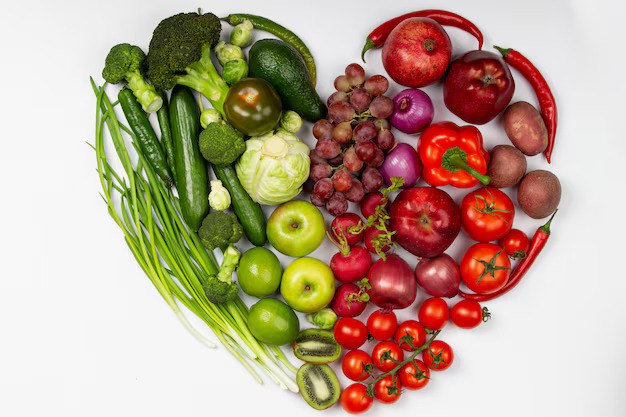7 Vegetables To Lower Cholesterol
When it comes to maintaining a healthy heart and reducing cholesterol levels, the answer might just be in your kitchen. While medications can be effective, dietary changes offer a natural, sustainable way to lower cholesterol. Among the most powerful tools in your arsenal? Vegetables.
Yes, certain vegetables are rich in fibers, antioxidants, and plant sterols that naturally help lower LDL (“bad”) cholesterol and support HDL (“good”) cholesterol. Incorporating these into your daily meals can make a significant difference in your cardiovascular health.
In this guide, we dive deep into 7 vegetables to lower cholesterol, exploring how each works, the best ways to consume them, and their overall benefits. Whether you’re managing high cholesterol or simply aiming for better heart health, this post will give you the tools you need.

1. Spinach
Why it works:
Spinach is rich in lutein, a powerful antioxidant associated with reducing cholesterol buildup in arteries. It also contains high amounts of soluble fiber, which binds with cholesterol in the digestive system and prevents it from being absorbed into the bloodstream.
Nutritional highlights:
- High in lutein and zeaxanthin
- Good source of fiber
- Low in calories
Best ways to consume:
- Add to smoothies for a heart-healthy breakfast
- Use as a base for salads
- Sauté with garlic and olive oil as a side dish
Extra tip: A cup of cooked spinach a day can help flush out cholesterol naturally while delivering vital nutrients like iron and magnesium.
2. Okra
Why it works:
Okra, often underrated, contains a unique gel-like substance called mucilage. This compound binds to cholesterol and carries it out of the body. Additionally, okra is packed with fiber and antioxidants that help improve heart health.
Nutritional highlights:
- High in mucilage fiber
- Rich in vitamins A, C, and K
- Contains polyphenols that reduce inflammation
Best ways to consume:
- Grilled or roasted as a side dish
- Added to soups or stews for a thickening effect
- Pickled for a tangy, gut-friendly snack
Extra tip: When cooked properly (not over-boiled), okra retains its cholesterol-lowering properties and maintains a pleasant texture.
3. Eggplant
Why it works:
Eggplants are rich in nasunin, a powerful antioxidant that protects cell membranes from oxidative stress. They are also high in soluble fiber, which helps lower LDL cholesterol.
Nutritional highlights:
- Contains nasunin (especially in the purple skin)
- Good source of soluble fiber
- Low in calories and fat
Best ways to consume:
- Grilled with herbs and olive oil
- Added to stir-fries or ratatouille
- Baked with a tomato-based sauce for a hearty meal
Extra tip: Keep the skin on! That’s where most of the antioxidants live.
4. Brussels Sprouts
Why it works:
Brussels sprouts are high in soluble fiber and glucosinolates, which help in liver detoxification and cholesterol regulation. They also promote bile production, aiding in fat digestion and cholesterol breakdown.
Nutritional highlights:
- High in fiber and glucosinolates
- Rich in vitamin C and K
- Contains alpha-lipoic acid, an antioxidant that supports cholesterol control
Best ways to consume:
- Roasted with a drizzle of balsamic vinegar
- Shaved into raw salads with lemon juice
- Sautéed with garlic and onions
Extra tip: Steaming Brussels sprouts preserves their cholesterol-lowering compounds better than boiling.
5. Carrots
Why it works:
Carrots contain pectin, a form of soluble fiber that helps lower blood cholesterol levels. Their high antioxidant content also combats inflammation, a key factor in heart disease.
Nutritional highlights:
- Rich in pectin and beta-carotene
- High in vitamin A
- Low glycemic index
Best ways to consume:
- Fresh in salads or as a snack
- Roasted with cumin and olive oil
- Blended into soups
Extra tip: Raw carrots offer the most fiber, but cooked carrots are richer in antioxidants. Mix both forms into your diet.
6. Kale
Why it works:
Kale is a cruciferous vegetable loaded with fiber, omega-3 fatty acids, and antioxidants. It helps lower LDL cholesterol while raising HDL levels thanks to its bile acid-binding properties.
Nutritional highlights:
- High in fiber, vitamins A, C, and K
- Contains sulforaphane, which supports detoxification
- Anti-inflammatory and cholesterol-lowering effects
Best ways to consume:
- Blended into green smoothies
- Massaged with lemon juice and olive oil for salads
- Baked into crunchy kale chips
Extra tip: Steaming kale enhances its ability to bind with bile acids, aiding cholesterol excretion.
7. Garlic (Honorable Mention)
Why it works:
Although technically a vegetable, garlic deserves a special mention. It contains allicin, a sulfur compound known for reducing cholesterol and blood pressure. While not rich in fiber like the others, its biochemical impact on heart health is profound.
Nutritional highlights:
- Contains allicin and other sulfur compounds
- Helps reduce plaque buildup
- Antimicrobial and anti-inflammatory
Best ways to consume:
- Raw in dressings or dips
- Roasted and spread on whole grain toast
- Added to sautéed vegetables for flavor and health boost
Extra tip: Crush or chop garlic and let it sit for 5-10 minutes before cooking to activate allicin.
Additional Tips to Maximize Benefits
- Eat a Variety: No single vegetable can do it all. Eating a colorful variety ensures you get a spectrum of nutrients.
- Pair with Healthy Fats: Olive oil, avocado, and nuts help absorb fat-soluble vitamins and antioxidants.
- Stay Consistent: Regular consumption over time is key to seeing real improvements.
- Limit Processed Foods: Even the best vegetables can’t offset a diet high in trans fats and refined sugars.

Final Thoughts
Lowering cholesterol naturally is not only possible but incredibly effective when approached holistically. Vegetables like spinach, okra, and Brussels sprouts are more than just sides on your plate—they are powerful allies in your journey to heart health.
By integrating these seven vegetables into your meals consistently, you’ll be taking a major step toward balanced cholesterol levels and a stronger, healthier heart.
References
- https://www.ncbi.nlm.nih.gov/pmc/articles/PMC6024687/
- https://www.health.harvard.edu/heart-health/how-fiber-helps-lower-cholesterol
- https://www.heart.org/en/healthy-living/healthy-eating/eat-smart/fats/dietary-fiber-and-heart-health
- https://www.ncbi.nlm.nih.gov/pmc/articles/PMC3614697/
- https://www.ncbi.nlm.nih.gov/pmc/articles/PMC4103721/
- https://www.ncbi.nlm.nih.gov/pmc/articles/PMC6519249/
- https://www.medicalnewstoday.com/articles/324361
- https://www.ncbi.nlm.nih.gov/pmc/articles/PMC4393508/